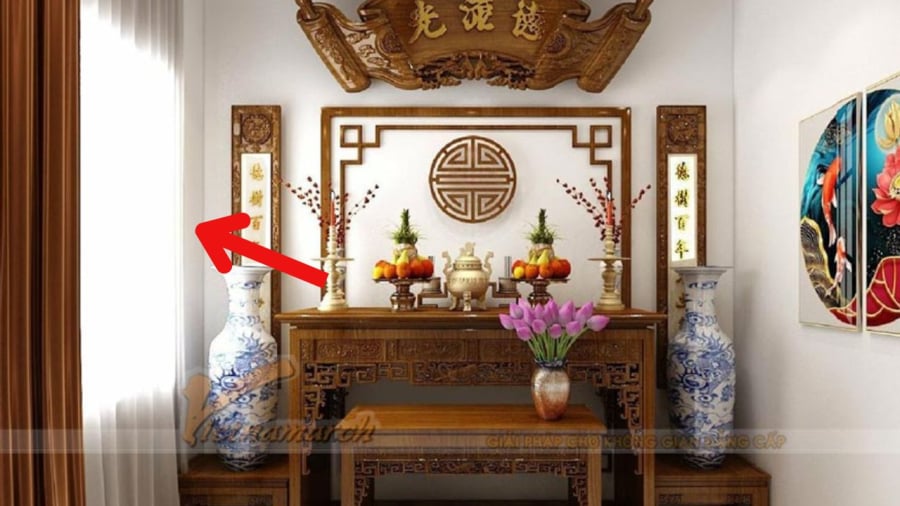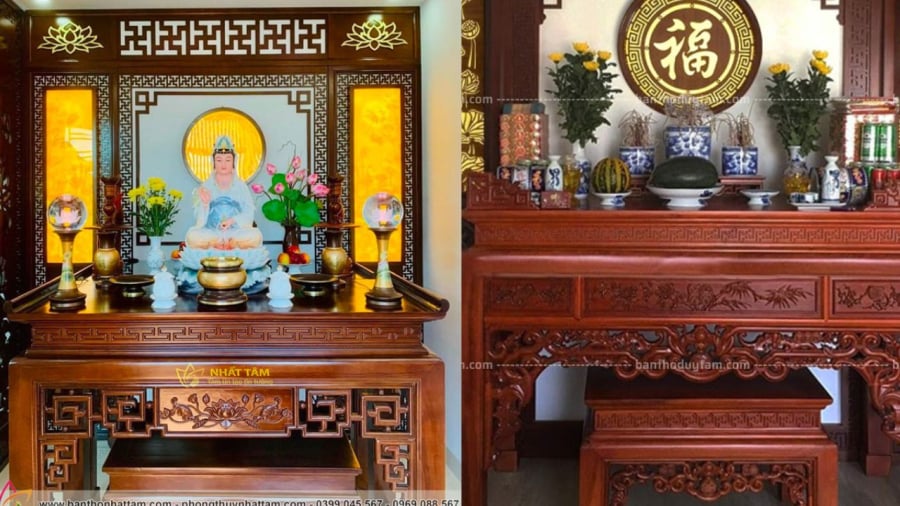In Vietnamese culture, the altar is a sacred space, expressing reverence for ancestors, deities, and the deceased. However, in modern housing conditions, especially in high-rise and multi-story homes, choosing an appropriate location for the altar is no longer as simple as it used to be. So, in a multi-story house, on which floor should the altar be placed for the best feng shui and convenience?
1. General principles for placing an altar in a multi-story house
Whether it is a two-story, three-story, or higher building, the altar must be placed in a solemn, quiet, elevated, and less-trafficked area. More than just a place of worship, the altar is a spiritual space—a connection between the mortal realm and the unseen world. Thus, its location greatly influences the energy of the house and the health, wealth, and luck of its occupants.

Some basic principles to remember, regardless of which floor it is placed on:
- Avoid placing the altar under a bathroom, staircase, or in a noisy room, near, or directly opposite a bathroom.
- Do not situate the altar in a damp, dark, or cramped space.
- The altar should have a solid backing, leaning against a solid wall.
- Do not place the altar facing away from the house or directly opposite the entrance or kitchen.
2. So, which floor is best for the altar?
Depending on the structure and needs of each family, the choice of floor for the altar may vary. Here is a detailed analysis:
a. Placing the altar on the top floor
According to feng shui and the experience of many experts, the highest floor of the house is the ideal location for the altar, especially in a three-story or higher building. This is because:
- It is elevated, airy, and separate from the noisy living space.
- No one walks above it.
- It is easier to design a separate worship room, creating solemnity and tranquility.
However, if placing the altar on the top floor, keep in mind the following:
- Arrange a solid roof to prevent direct sunlight or wind and rain. Avoid strong light and excessive heat.
- Do not turn the top floor into a storage area or drying yard next to the worship room.
- Provide convenient stairs if the family frequently burns incense and offers rituals.
If the top floor of your house is used for storage, does not have enough surrounding walls, and is exposed to sunlight and wind, then it is not a suitable location for a worship room. Therefore, caution is necessary.

b. Placing the altar on the middle floor (second floor or mezzanine)
If the top floor is unsuitable (too hot, used for drying clothes, infrequently accessed, or lacking privacy, with excessive positive chi) many families choose to place the altar on the middle floor—for example, the second floor of a three-story house. This option is reasonable if:
- The second floor has a quiet space, less affected by daily activities.
- There is no bathroom or bedroom directly above the altar, especially no bed.
- The middle floor is also convenient for frequent rituals without climbing high stairs, suitable for families with elderly members.
c. Placing the altar on the first floor (ground floor)—consider carefully
In some cases (when there are elderly family members who cannot move around easily), the host places the altar on the ground floor for convenience. However, according to feng shui:
- The ground floor is usually a place for receiving guests and common activities, so it does not ensure tranquility and solemnity.
- It is easily affected by dust and dampness, which impacts the energy of the worship space.
If you still want to place it on the ground floor, consider the following:
- Design a separate worship room with a closed door, not connected to the kitchen or bathroom.
- Avoid placing the altar directly opposite the front door or in the middle of a walkway.
3. Suggested altar placement according to feng shui
In addition to the floor, the direction of the altar is also important. Hosts should consult their age and life force to choose a suitable direction:
- Common good directions: Northeast, Southwest, North, or East.
- Avoid bad directions like West and Northwest (directions with harsh sunlight) or the opposite direction of the house.
Additionally, do not place the altar facing the kitchen, bathroom, or mirror, as this will cause chi field conflicts, affecting finances.
4. Notes on designing and decorating the worship room
Regardless of which floor the altar is on, the worship room needs to be designed and arranged properly:
- The color scheme should be subdued and gentle (brown, light yellow, dark wood…)
- Do not hang unrelated pictures in the worship room.
- Limit the placement of potted plants and feng shui items on the altar.
- Maintain cleanliness, change the water regularly, and keep the altar dust-free.
The best location for the altar is not just determined by the height of the floor, but by the most dignified and worship-appropriate space in the house. Therefore, depending on the structure of each family, choose the best feng shui location that suits the family’s activities and occupants. Hosts can flexibly choose the middle floor or ground floor, as long as it ensures solemnity, tranquility, and good feng shui.
Consider the altar not only as a place of worship but also as a spiritual center, a bond between the spiritual realm and the generations of the family. Therefore, choosing a suitable location for the altar will bring long-lasting luck, peace, and prosperity.
Reference information for divination
Place These 3 Things in Your Home: Attract Wealth and Change Your Destiny
We all desire prosperity and abundance in our lives, and often wonder how we can attract good fortune. Believe it or not, there are three simple things you can have in your home that are said to invite wealth and prosperity. These three items are believed to be lucky charms that can bring about a positive change in your financial situation and overall well-being. So, if you’re seeking a boost in your finances and a little extra luck, keep reading to discover the three must-haves for your home!
The Money Trees: Unlocking Prosperity with Nature’s Golden Trio
Introducing the top 3 easy-to-grow houseplants with large, majestic leaves that are sure to bring a touch of grandeur and good fortune to your home. These stunning plants not only add a pop of color and life to any space but are also believed to have positive effects on your surroundings, attracting wealth and prosperity according to Feng Shui principles.



































